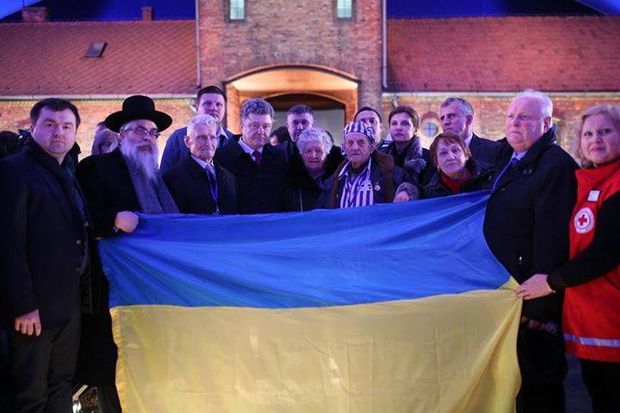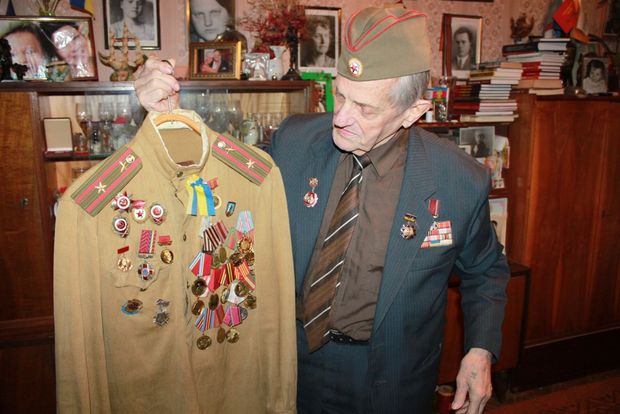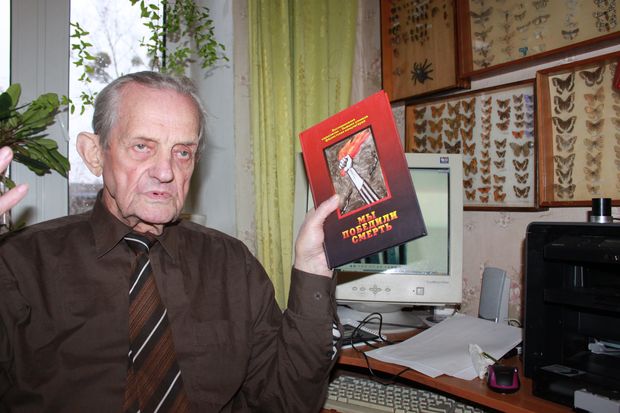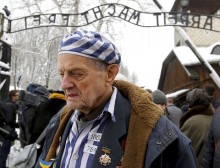We met Professor Ihor Malitsky in Kharkiv after he had come back from Poland, where he took part in the ceremonies to mark the 70th anniversary of the liberation of the Auschwitz-Birkenau concentration camp [the town’s Polish name is Oswiecim. – Ed.]. Malitsky was kept in this death camp from the spring until the fall of 1944 and then transferred to an even more terrible and, admittedly, inescapable place – Mauthausen in Austria, – from which he and his fellow prisoners still managed to run away in April 1945. A report with a photograph of the professor, who put on, for the ceremony, a striped robe with a yellow-blue ribbon, provoked a number of abusive comments by the Russians. “One of them wrote: ‘We will continue to kill Ukrainians after the war, too.’ This is a true fascist morality,” Malitsky concludes after reading some online publications. He says the brutal treatment of Ukrainian prisoners-of-war by the “militia” in the Donbas is comparable to Nazi atrocities.
LOVE OF LIFE
Unexpectedly, there are a lot of decorative towels, flags of Ukraine, old photographs of his ancestors in Ukrainian folk costumes, and himself, a little boy in an embroidered shirt, in Malitsky’s modest apartment. “I am a 100th-generation Ukrainian. I wore an embroidered shirt not because it was a vogue but because it was an article of casual wear,” he says. When talking, he switches to both Ukrainian and Russian and tries to persuade us that he speaks Russian better than the Russians do – he even gives lectures in it. He adds that he also knows German, Polish, Czech, the sign language, as well as “the commanding, foul, and Kharkiv tongues.” “Only a Kharkiv resident will understand such words as ‘trempel’ and ‘raklo,’” Malitsky says laughing. The professor keeps on joking, and his cheerfulness is infectious. When a smoky cat walks out of the corridor, he explains: “I have three of them. They are all females. Why? Because I am of the right orientation.” He says he puzzled his girl students last year when he swore by his children and grandchildren that he was… 11. “You didn’t hear the end of my phrase, as you never hear my lectures to the end,” he explained to the perplexed girls. “I am 11… before I turn 100!” Incidentally, students call him MIF (“myth”) – an acronym of his initials.

Malitsky has four grandchildren and even three great-grandchildren, and he is going to celebrate his 90th birthday on February 12. The richness of his life really strikes you, taking into account a venerable age and the inhuman ordeals he has undergone. The professor teaches the course “Computerized Technologies in Mechanical Engineering” at the Engineering and Pedagogical Academy (UZPI previously), travels to Europe to give lectures and to spend a holiday, and jogs in the morning. He can even dip into an ice hole and then knock back a shot of cognac to get warm. His study room’s walls are hung with a large number of butterflies and beetles he caught in the Caucasus, Central Asia, Cuba, and Africa. The professor confesses that he often plays computer games until 5 a.m. After the demise of his adorable wife, he takes care of the household, makes soups, and preserves fruit. “I meet three basic requirements in my life:” Malitsky says, sharing the secrets of his amazing life, “not to be greedy, not to be envious, and to love women. I have never betrayed my fatherland, my army, and my wife.” He also says that love of life helped him hold out in the bloody horror of four death camps, when many could not endure tortures and threw themselves against the live wires.
“YOU MUST NOT USE THE SYMBOLS YOU DO NOT DESERVE”
There are also lots of St. George’s ribbons in Malitsky’s apartment. “The Russians call me ‘Banderaite’ and ‘ukrop’ for the flag of Ukraine. But in my homeland I am called ‘separatist’ for St. George’s ribbons. But it is a symbol of my victory, don’t you see?” Malitsky says in distress. “My grandfather, a Ukrainian Cossack, fought in the Russo-Japanese war and was awarded two St. George’s crosses and ribbons. So, should I throw them away now?”

Malitsky thinks that many of our troubles result from the attempts to twist history. He is convinced that only those who fought in the Great Patriotic War can wear St. George’s ribbons. “You must not use the symbols you do not deserve,” Malitsky muses. “The Donbas separatists have no right to wear St. George’s ribbons. It is a war veteran’s award.”
He is proud of his glorious Ukrainian roots, but he condemns nationalist sentiments among the Ukrainians. He admires his Uncle Oleksii, a “true Makhnoite,” who used the machinegun to put to flight those who came to his village to crack down on better-off peasants.
“There is Bohdan’s Hill in Chyhyryn, where there is a cemetery with the grave of Cossack Ataman Bohun. Next to him lies Colonel Malitsky, a forefather of mine. In Poland, President Poroshenko came up to me and said: ‘It’s so good that there are true Ukrainians.’ And I said Ukraine is my state and I love it. But nationalism, be it Russian, Jewish, or Ukrainian, is an evil,” the professor says.

Ihor Malitsky’s father, Fedir, was also a true patriot of Ukraine and a gallant officer. But he was arrested in 1938 for allegedly being a Ukrainian nationalist and a Polish spy and executed by firing squad in 1943. Malitsky also blames Stalin for eliminating top Soviet military officers on the eve of the war. But he says Stalin at least did not kindle a war, as Putin is doing today – “he is stirring up hatred and war by means of awful propaganda.” And this hatred is aimed not only at the Ukrainians, but also at the Russians themselves, Professor Malitsky believes.
“I WOULD NOT SHAKE PUTIN’S HAND”
In the two days in Oswiecim, Professor Malitsky attended conferences and a public prayer as well as spoke to the presidents of Poland and Ukraine. “I always say what I think – to students and to presidents. I said to Petro Poroshenko: ‘Many Italian and German children come to have a picture taken with me, but why no meetings are organized between schoolchildren and me in Ukraine?’”
Malitsky says he highly esteems the president of Ukraine. “But I would not shake Putin’s hand,” the legendary veteran says. “Putin did his best to make the Russian and Ukrainian peoples quarrel – this applies to both the government and the grassroots. My daughter lives in Belgorod. And what she is told on Russian TV channels is beyond comprehension. The Ukrainians nailed a small boy onto the notice board for speaking Russian! Why these lies? I, a professor, deliver lectures in Russian! Yes, there are nationalists in Ukraine, but there are much more of them in Russia, for they have a virtually Hitlerite regime.”
The war veteran demands that the Russians do not interfere into Ukraine’s internal affairs. “We will be choosing the government by ourselves,” Malitsky says. “Those who will win the majority will be our government, while the rest will be in opposition. But nobody dare touch my Ukraine!”

The former death camp inmate is especially outraged by the brutalization of Ukrainian prisoners of war in the Donbas, the videos of which have been posted in Internet. “I saw a pretty woman in Donetsk come to our POWs and hit them, while they were bound up! Our women never beat German prisoners. On the contrary, they gave them food.” The footage in which “militiamen” force Ukrainian soldiers to kneel down and eat yellow-blue stripes reminded Malitsky of the Nazi atrocities, when prisoners were forced to eat earth.
“I’ve never thought that Russia might fight against Ukraine,” the veteran says in despair.
UKRAINE WILL WIN
The experienced veteran is highly critical of Ukraine’s General Staff top brass. “I could never imagine that they would surrender Crimea. As a military person, I could find no peace, thinking about why they were not defending this land. There were so many of our troops there!” Malitsky recalls and adds: “I wouldn’t have given up Crimea, I’d have fought to the end. If we had defended Crimea, the war wouldn’t have begun. Putin would have been afraid of an open conflict.” Analyzing the Ilovaisk tragedy and the latest losses at the Donetsk airport, Malitsky is convinced that the defeat must be blamed on the “outrageously inadequate military leadership.” He has no doubts that Russia has deployed some of its troops in the Donbas and is delivering weapons, and he thinks that Ukraine can and must defeat a relatively small Russian military contingent.
The courageous legendary Ukrainian hopes that Ukraine will win.
“Ukraine lived and will live on!” Professor Malitsky says assuredly. “There was a great Kyivan Rus’ here, a powerful state that sent creepers down Europe’s spine until an internecine feud began. And, much later, the tsarist army mostly consisted of Ukrainians. Ukraine is a gene which will live on and develop.”
The professor points out that the industry and research have always been more developed in Ukraine than in Russia and that, to ensure this country’s prosperity, this country must change its attitude to education – instead of spawning an enormous number of lawyers and economists, it should train as many technicians as possible, who will be reviving the industry and developing new technologies. It is also important that new-generation professionals stay in Ukraine instead of moving abroad.
In Ihor Malitsky’s opinion, the main precondition for a victory is that societal elites rally together and the government incorporate the best talented people who will make decisions with due account of the interests of all Ukrainians.







